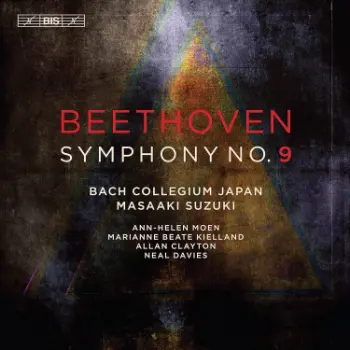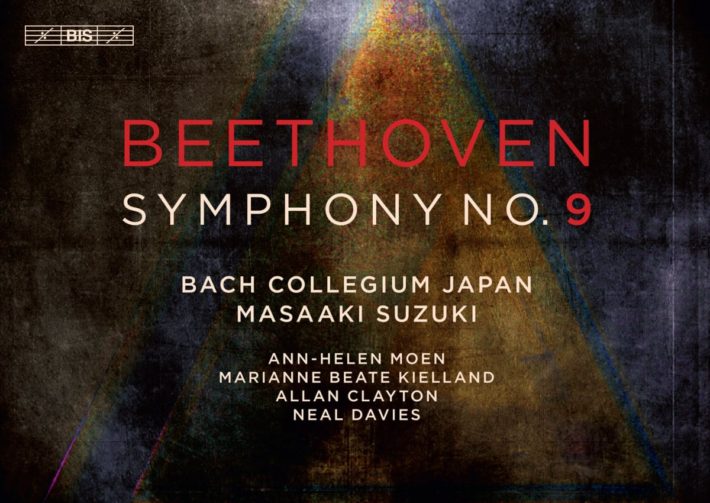Having completed their fabulous recordings of Bach’s choral works, and after a fine version of the Missa Solemnis last year, Bach Collegium Japan and Masaaki Suzuki now turn their attention to Beethoven’s final symphony. One of the recording’s many strengths is Suzuki’s chosen tempi: while still faster than most modern-instrument recordings, this is one of the slowest original instrument performances on record. Giving the music more time to breathe allows the Romantic nobility of Beethoven’s music to come to the fore, a quality that is lost in many other original instrument performances.

Suzuki and his orchestra conjure a beguilingly hushed opening that quickly builds to a powerful climax (0’27”). The BIS recording is exemplary in capturing a wide soundstage with warmth and clarity. In comparison, Gardiner’s recording is overly bright and analytical, making any music above Forte excessively harsh. More importantly, Suzuki maintains a potent sense of forward momentum throughout the first movement that empowers the explosive climax at 7’49” and continues that intensity right up the end of the movement. Immerseel’s performance fails to maintain that momentum, and despite excellent orchestral playing of Anima Eterna, much of the first movement seems to hang fire. Krivine’s performance can at times seem episodic, moving from one climax to the next, whereas Suzuki ensures that the music develops and expands from those initial mysterious murmurs into an organic and powerful whole.
In the second movement, Suzuki is again a bit slower (14’03”) compared to his colleagues (Gardiner 13’07”; Immerseel 13’28”; Krivine 13’30”; Norrington slower still 14’20”). While the faster tempos provide more overtly virtuosic playing, most especially from Gardiner’s orchestra, Suzuki’s performance is no less impressive, finding nobility and rowdy humor that is missing in the faster performances. Norrington’s performance is also successful at this, although his choice of tempo for the trio (one of Beethoven’s most difficult metronome markings to honor) is unconvincingly slow.
The third movement is exceptional, Suzuki once again allowing himself a slower tempo than that indicated by Beethoven’s metronome marking. The marking for this movement is a flashpoint of conflict between traditionalist and “historically informed” performers. Norrington, closely follows Beethoven’s metronome markings, performs the movement in only 11’08”, which is a shock to any listener who knows the interpretations of Klemperer (a “quick” traditionalist at 15’02”); Karajan (Berlin/1960s cycle, 16’30”), Walter (Columbia/Sony cycle 17’41”); Furtwängler (Bayreuth, 19’40”!!). Indeed, Norrington and Immerseel’s (12’26”) performances do seem content to simply ensure the music is played with rhythmic accuracy and a beautiful tone. Suzuki proves far more successful at drawing out the music’s complex web of emotions, and any concerns one might have about original instruments being unable to match the beauty and richness of tone found in their modern counterparts – will find those fears unfounded in this gorgeous and deeply involving performance.
The fourth movement is hugely impressive, from the opening chord, terrifyingly dissonant, to the nuanced and precise playing of the orchestral basses during their recitative, leading into a particularly exciting rendition of the orchestral variations on the “Ode to Joy.” The entry of the singers raises the bar still further, soloists and choir uniformly excellent, with near-perfect intonation and crisp diction. A key aspect of Suzuki’s wonderful Bach recordings is the complete engagement his singers give to the text, and that quality is also integral to this performance. Choir and soloists passionately embody Beethoven’s (and Schiller’s) belief in the brotherhood of humanity. Surely it is a message that we need to hear, and believe, now more than ever.
This is an exceptional release, with highly informative and interesting notes by Beethoven scholar Ernst Herttrich. The recording is everything we expect from BIS, and Bach Collegium Japan and their conductor Masaaki Suzuki are proving to be first-rate performers of an increasingly wide range of music. No one recording can capture every aspect of Beethoven’s magnum opus, but this one comes close and belongs in the library of every Beethoven lover.
Beethoven – Symphony No. 9 (“Choral”), Op. 125
Ann-Helen Moen – Soprano
Marianne Beate Kielland – Mezzo
Allan Clayton – Tenor
Neal Davies – Bass
Bach Collegium Japan
Masaaki Suzuki – Conductor
BIS Records, hybrid SACD 2451




















